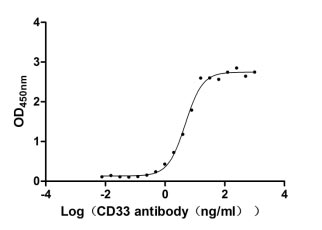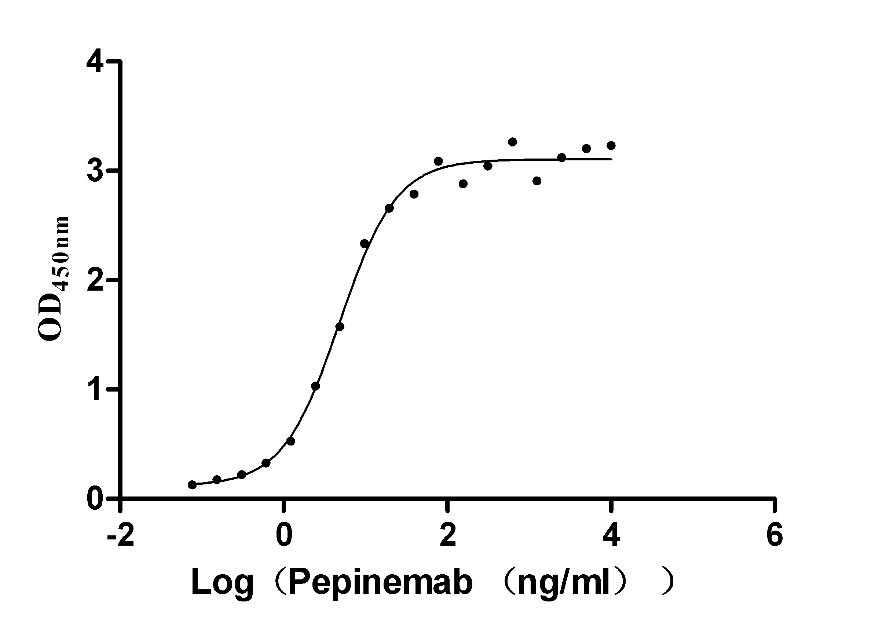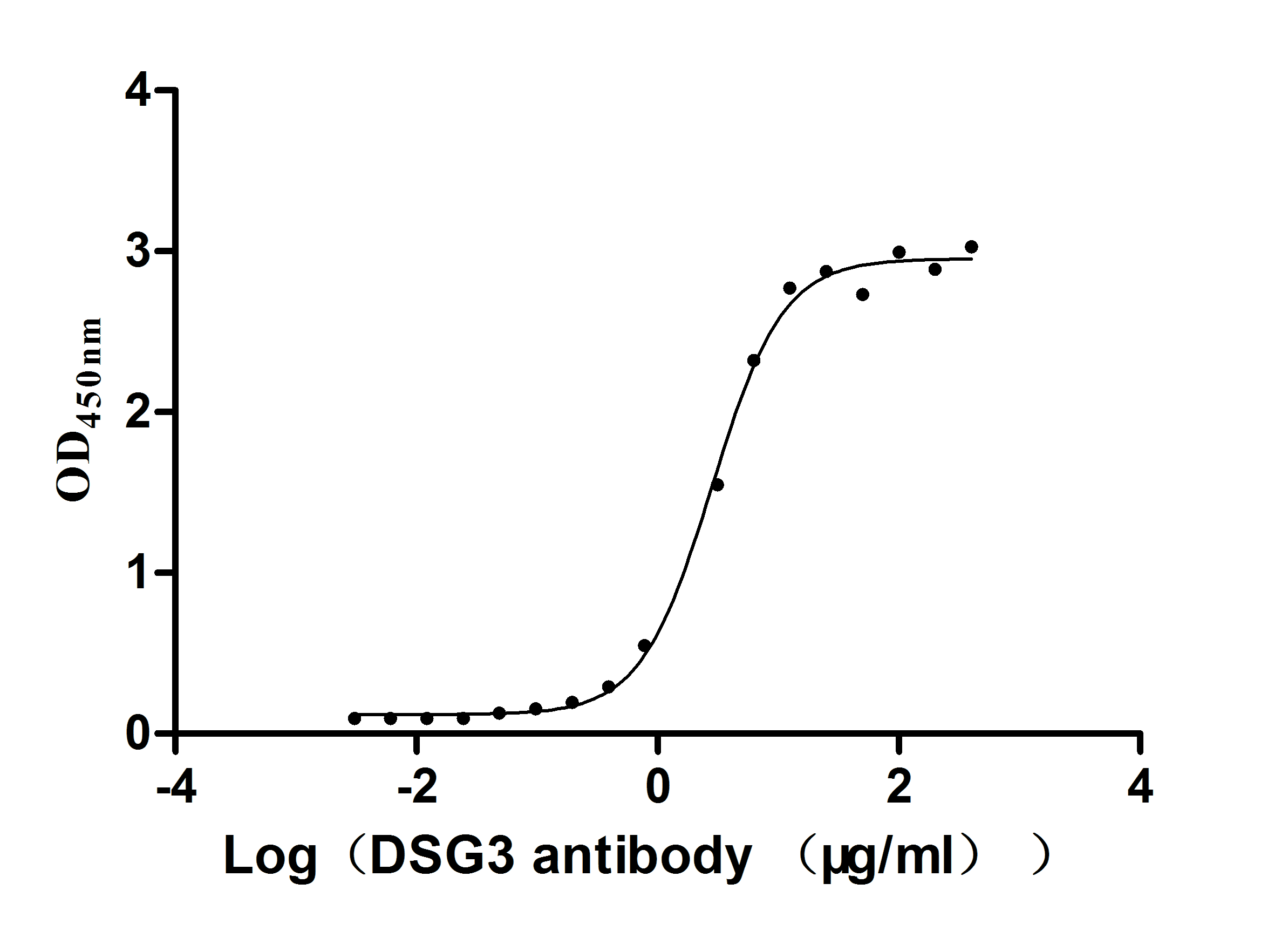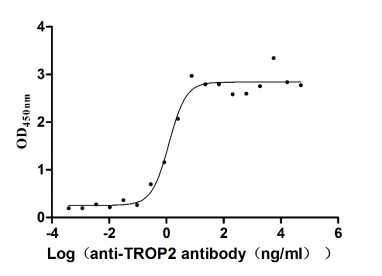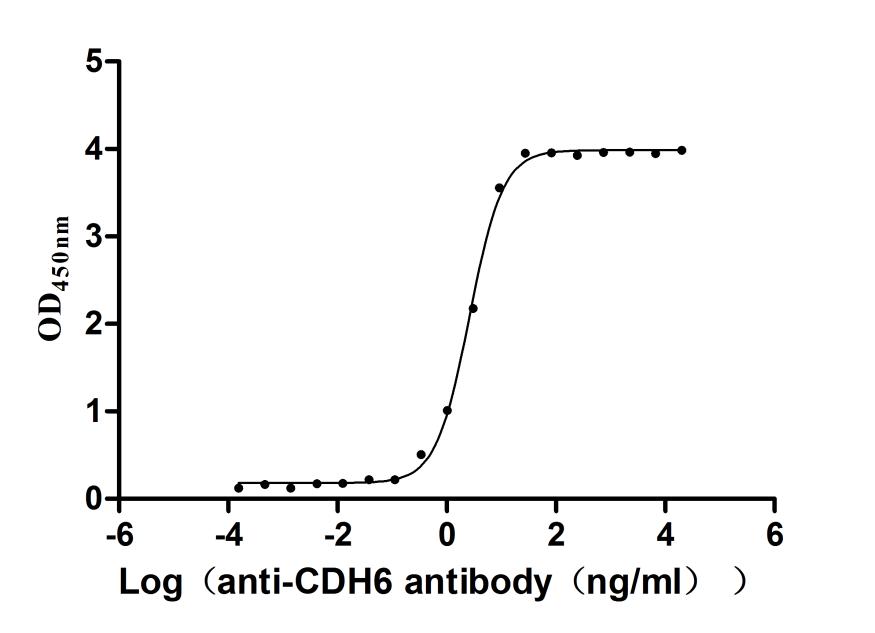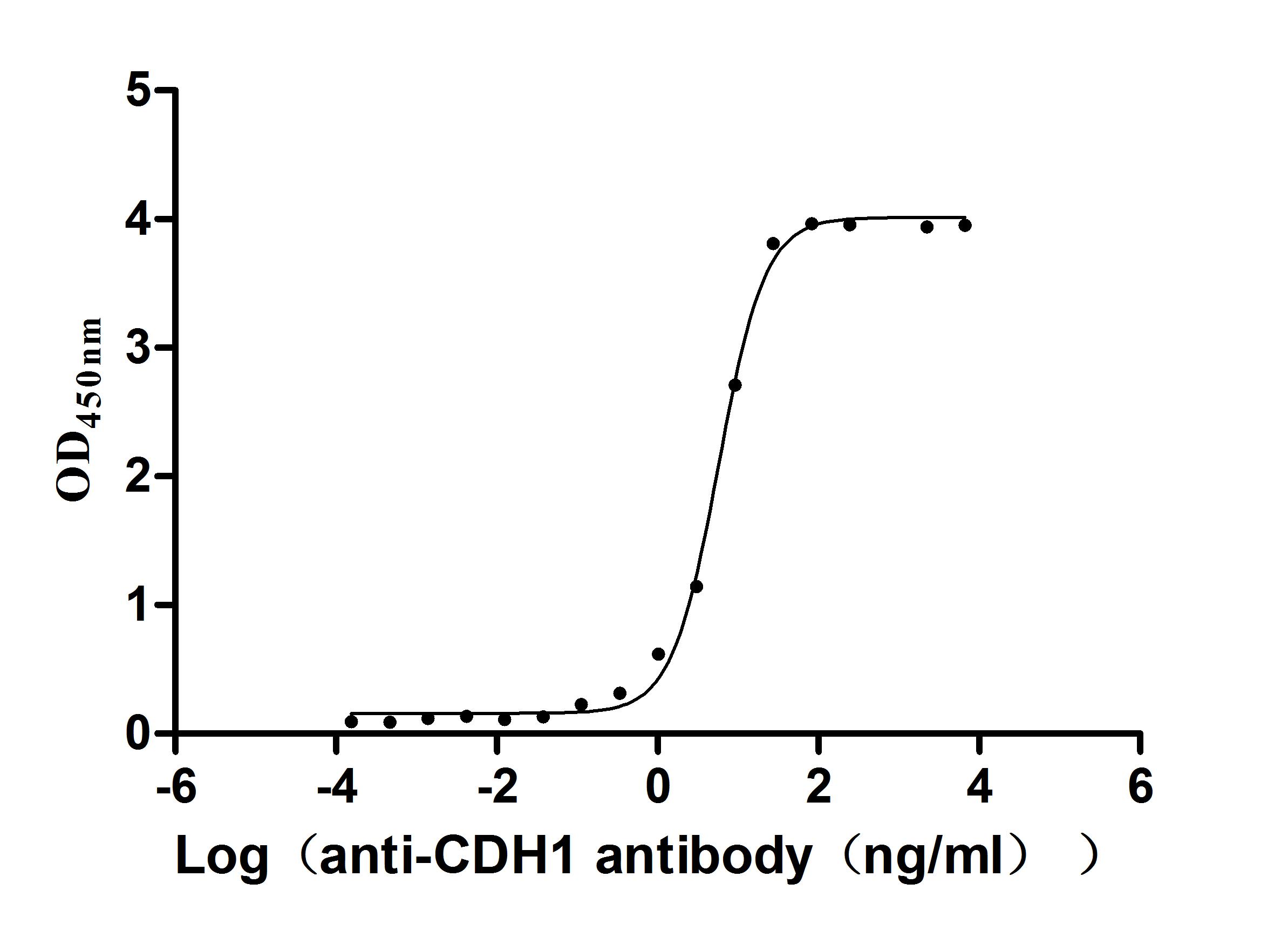Recombinant Mouse Cholecystokinin (Cck)
-
货号:CSB-YP004771MO
-
规格:
-
来源:Yeast
-
其他:
-
货号:CSB-EP004771MO
-
规格:
-
来源:E.coli
-
其他:
-
货号:CSB-EP004771MO-B
-
规格:
-
来源:E.coli
-
共轭:Avi-tag Biotinylated
E. coli biotin ligase (BirA) is highly specific in covalently attaching biotin to the 15 amino acid AviTag peptide. This recombinant protein was biotinylated in vivo by AviTag-BirA technology, which method is BriA catalyzes amide linkage between the biotin and the specific lysine of the AviTag.
-
其他:
-
货号:CSB-BP004771MO
-
规格:
-
来源:Baculovirus
-
其他:
-
货号:CSB-MP004771MO
-
规格:
-
来源:Mammalian cell
-
其他:
产品详情
-
纯度:>85% (SDS-PAGE)
-
基因名:Cck
-
Uniprot No.:
-
别名:CckCholecystokinin; CCK) [Cleaved into: Cholecystokinin-33; CCK33); Cholecystokinin-12; CCK12); Cholecystokinin-8; CCK8)]
-
种属:Mus musculus (Mouse)
-
蛋白长度:Full length protein
-
表达区域:21-115
-
氨基酸序列QPVVPAEATD PVEQRAQEAP RRQLRAVLRT DGEPRARLGA LLARYIQQVR KAPSGRMSVL KNLQSLDPSH RISDRDYMGW MDFGRRSAED YEYPS
-
蛋白标签:Tag type will be determined during the manufacturing process.
The tag type will be determined during production process. If you have specified tag type, please tell us and we will develop the specified tag preferentially. -
产品提供形式:Lyophilized powder
Note: We will preferentially ship the format that we have in stock, however, if you have any special requirement for the format, please remark your requirement when placing the order, we will prepare according to your demand. -
复溶:We recommend that this vial be briefly centrifuged prior to opening to bring the contents to the bottom. Please reconstitute protein in deionized sterile water to a concentration of 0.1-1.0 mg/mL.We recommend to add 5-50% of glycerol (final concentration) and aliquot for long-term storage at -20℃/-80℃. Our default final concentration of glycerol is 50%. Customers could use it as reference.
-
储存条件:Store at -20°C/-80°C upon receipt, aliquoting is necessary for mutiple use. Avoid repeated freeze-thaw cycles.
-
保质期:The shelf life is related to many factors, storage state, buffer ingredients, storage temperature and the stability of the protein itself.
Generally, the shelf life of liquid form is 6 months at -20°C/-80°C. The shelf life of lyophilized form is 12 months at -20°C/-80°C. -
货期:Delivery time may differ from different purchasing way or location, please kindly consult your local distributors for specific delivery time.Note: All of our proteins are default shipped with normal blue ice packs, if you request to ship with dry ice, please communicate with us in advance and extra fees will be charged.
-
注意事项:Repeated freezing and thawing is not recommended. Store working aliquots at 4°C for up to one week.
-
Datasheet :Please contact us to get it.
相关产品
靶点详情
-
功能:This peptide hormone induces gall bladder contraction and the release of pancreatic enzymes in the gut. Its function in the brain is not clear. Binding to CCK-A receptors stimulates amylase release from the pancreas, binding to CCK-B receptors stimulates gastric acid secretion.
-
基因功能参考文献:
- Study shows that independent of the neurochemical content, cholecystokinin/type 1 cannabinoid receptor-expressing interneurons have similar physiological and morphological properties, providing an endocannabinoid-sensitive synaptic inhibition onto the amygdalar principal neurons. PMID: 28391401
- In summary, our study is the first to indicate that CCK/CCK-AR pathway is critical and protective against liver I/R injury. The activation of this pathway not only prevents hepatocellular apoptosis, but also reduces inflammatory response by suppressing NF-kappaB. PMID: 28521244
- CCK/GLP-1 play contributory roles in anorexia induction by trichothecenes T-2 toxin, HT-2 toxin, diacetoxyscirpenol and neosolaniol. PMID: 28964791
- GPR120-induced incretin glucse-dependent insulinotropic polypeptide secretion is indirectly mediated by cholecystokinin. PMID: 28324023
- Medullary interstitial cells respond to body fluid expansion by CCK release for feedback regulation of the late proximal tubular reabsorption. PMID: 28298361
- results suggest that normal integration of CCK+ basket cells in cortical networks is key to support spatial coding in the hippocampus. PMID: 28394324
- PC7 has a critical role in normal processing of cholecystokinin in mouse brain PMID: 27923657
- These studies reemphasize the beneficial effects imparted by co-administration of obestatin and CCK8 and their potential use towards countering obesity. PMID: 27032885
- new information on the cell specific localization of NUCB2/nesfatin-1 in the intestinal mucosa, and a novel function for nesfatin-1 in modulating intestinal CCK and PYY expression and secretion PMID: 26920055
- Results showed that CCK is important for lipid transport and energy expenditure to control body weight in response to dietary lipid feeding PMID: 26171590
- SP1 results in a CCK response deficiency that may contribute to the increased meal size and overall hyperphagia in synphillin-1 transgenic mice PMID: 26569394
- active GLP-1 produced in the islet stimulates cholecystokinin production and secretion in a paracrine manner via cyclic AMP and CREB. PMID: 25984632
- Data (including data from studies using transgenic mice) suggest that enhanced Cck expression in pancreatic beta-cells protects these cells from the cell-withering effects of aging, apoptotic stress, and (streptozotocin-induced) diabetes type 2. PMID: 26394663
- total Ca(2+) mobilization evoked by CCK-8 was attenuated by a 30% in the presence of 100 microM melatonin compared with the responses induced by CCK-8 alone. PMID: 25084987
- Endogenous cholecystokinin is in part responsible for the development and progression of pancreatic cancer. PMID: 25058882
- octapeptide exerts a direct effect on T cells, which is dependent on cholecystokinin-2 receptor PMID: 24704498
- Data demonstrate that the ERK pathway is required for CCK-stimulated pancreatic adaptive growth. PMID: 25104499
- I cells in duodenum are enriched in expression of CCK and ghrelin. PMID: 25004095
- Data show the transcriptional activation of the cholecystokinin gene by DJ-1 through interaction of DJ-1 with RREB1 and the effect of DJ-1 on the cholecystokinin level. PMID: 24348900
- This study concluded that CCK is a mediator of dietary fat-associated pancreatic cancer, and it is also involved in the invasiveness of pancreatic tumors. PMID: 24817409
- CCK enhances cholesterol absorption by activation of a pathway involving CCK1R/CCK2R, Gbetagamma, PI3K, Akt, Rab11a, and NPC1L. PMID: 24692543
- mouse corneal afferent sensory neurons expressed CCK and GAST, and the CCK1R receptors. PMID: 24576871
- Gastric PAI-1 modulates vagal effects of cholecystokinin. PMID: 23816469
- ILDR1 regulates CCK release through a mechanism dependent on fatty acids and lipoproteins. PMID: 23863714
- hnRNP-K regulates extracellular matrix, cell motility, and angiogenesis pathways. Involvement of the selected genes (Cck, Mmp-3, Ptgs2, and Ctgf) and pathways was validated by gene-specific expression analysis PMID: 23564449
- CD36 is a major mediator of FA-induced release of CCK and secretin. These peptides contribute to the role of CD36 in fat absorption and to its pleiotropic metabolic effects. PMID: 23233532
- a lineage of mature enteroendocrine cells have the ability to coexpress members of a group of functionally related peptides: CCK, secretin, GIP, GLP-1, PYY, and neurotensin PMID: 23064014
- peripheral apo AIV requires an intact CCK system and vagal afferents to activate neurons in the hindbrain to reduce food intake PMID: 23027805
- These data suggest that a mixture of guar gum and fructo-oligosaccharide can maintain its appetite suppressant effect in fatty media. PMID: 23054308
- Our data demonstrate that CCK expressed in the basolateral amygdala represents a key brain substrate for anxiogenic and depressant effects of the peptide. PMID: 22613736
- expression of CCK is increased in hippocampal pyramidal cells in mice with recurrent, spontaneous seizures PMID: 22155653
- Data suggest that CCK acts to increase glutamatergic transmission to the preproglucagon-positive neurons; this action appears to involve activation of alpha1-adrenergic receptors. PMID: 21885869
- Simotang enhances the gastrointestinal motility in chronically stressed mice by regulating the serum motilin level and the expression of cholecystokinin. PMID: 21472126
- Gene expressions of ghrelin, PYY, and CCK was increased in the gastrointestinal tract of the hyperphagic intrauterine growth restriction rat offspring. PMID: 21264794
- Cholecystokinin signalling is not involved directly in light-induced resetting of the suprachiasmatic nucleus or in regulating its function. PMID: 20731710
- Short-term DeltaFosB overexpression increases both Cck promoter activity and gene expression. PMID: 20226774
- Conjugated linoleic acid isoforms are particularly potent CCK secretagogues, which also boost intracellular stores of CCK. PMID: 20352619
- CCK is up-regulated by islet cells during obesity and functions as a paracrine or autocrine factor to increase beta-cell survival and expand beta-cell mass to compensate for obesity-induced insulin resistance. PMID: 20534724
- CCK is involved in regulating the metabolic rate and is important for lipid absorption and control of body weight in mice placed on a high-fat diet. PMID: 20117110
- Lack of CCK induces gallbladder hypomotility that prolongs the residence time of excess cholesterol in the gallbladder, leading to rapid crystallization and precipitation of solid cholesterol crystals. PMID: 19836465
- role of anorectic effects possibly by enhancing release of pancreatic amylin PMID: 12576089
- In whole area of hippocampus, NPY-, SOM- (somatostatin), CCK-, and VIP-positive neurons accounted for about 31%, 17%, 7%, and 8% of GABAergic neurons, respectively. PMID: 12746872
- Intense cholecystokinin immunoreactivity is found in the mossy fiber pathway (stratum lucidum and dentate hilus) and in the inner molecular layer of the dentate gyrus. PMID: 14643757
- Lack of gastrin impairs gastrin-enterochromaffin-like cell axis, whereas lack of gastrin and CCK impairs both hormonal pathways. In gastrin-CCK double-knockout mice, acid secretion is controlled by cholinergic vagal stimulation, normalizing acid output. PMID: 14762785
- In this review, tissue-specific processing of cholecystokinin precursor in brain and gut to a large extent can be explained by the roles of prohormone convertases 1 and 2. PMID: 15075450
- These results indicate that CCK provides an inhibitory influence on GnRH-1 neuronal migration, contributing to the appropriate entrance of these neuroendocrine cells into the brain, and thus represent the first report of a developmental role for CCK PMID: 15152034
- Psychological stress inhibits the small intestinal transit, probably by down-regulating CCK and up-regulating VIP expression in small intestine. PMID: 15655834
- Both gastrin and combined gastrin-cholecytokinin deficiency reduced the gastric IAPP and Peptide Yy expression. PMID: 16002530
- prohormone convertase 2 is important for cholecystokinin processing PMID: 16174778
- results provide the first direct evidence that prohormone convertase 5 (PC5) is involved in CCK processing PMID: 16266771
显示更多
收起更多
-
亚细胞定位:Secreted.
-
蛋白家族:Gastrin/cholecystokinin family
-
数据库链接:
KEGG: mmu:12424
STRING: 10090.ENSMUSP00000035120
UniGene: Mm.2619
Most popular with customers
-
Recombinant Human Myeloid cell surface antigen CD33 (CD33), partial (Active)
Express system: Mammalian cell
Species: Homo sapiens (Human)
-
Recombinant Human Semaphorin-4D (SEMA4D), partial (Active)
Express system: Mammalian cell
Species: Homo sapiens (Human)
-
Recombinant Mouse Desmoglein-3 (Dsg3), partial (Active)
Express system: Mammalian cell
Species: Mus musculus (Mouse)
-
Recombinant Human Tumor-associated calcium signal transducer 2 (TACSTD2), partial (Active)
Express system: Mammalian cell
Species: Homo sapiens (Human)
-
Recombinant Human Cadherin-6(CDH6),partial (Active)
Express system: Mammalian cell
Species: Homo sapiens (Human)
-
Recombinant Human Cadherin-1(CDH1),partial (Active)
Express system: Mammalian cell
Species: Homo sapiens (Human)


